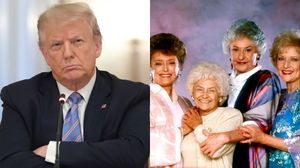Algerian boxer Imane Khelif was in the ring for less than a minute before her opponent, Angela Carini of Italy, abandoned the fight. While we didn't know at the time what prompted Carini's decision, politicians, podcasters, and netizens with transphobic views went to social media to "condemn" Khelif for being a trans woman competing.
But Khelif is a cisgender woman.
"The Algerian boxer was born female, was registered female, lived her life as a female, boxed as a female, has a female passport," said Mark Adams, a spokesman for the International Olympic Committee (IOC), at a press conference on Friday. "This is not a transgender case."
Another Olympian, Taiwan's Lin Yu-ting, has faced similar attacks, especially from the UK's most famous transphobe, She Who Shall Not Be Named. Despite the IOC's confirmation of these competitors' genders, folks have continued to question their identity, sharing misinformed opinions and posts regarding chromosomes.
Congrats to the class of netizens who earned their cytogenetics degrees this week.
Female athletes who don't fit the mold of some beauty standard face transphobic rhetoric in various degrees from commentators. And it goes beyond the world of sports.
When Eve Gilles was crowned Miss France 2024 last year, a bizarre furor erupted over her svelte frame and très chic short haircut. Finger-pointing and tongue-wagging spurred outcries of "wokeness" taking hold of a century-old beauty pageant.
Alas, there was no trans interloper. Gilles was born a cis woman and was proud of her pixie cut, desiring to break the long-held standard of winners having long hair and tellingThe Independent, "No one should dictate who you are."
Suspicions of cis women as trans aren't new, especially when it comes to women of color. When Caster Semenya sprinted to gold at the 2009 World Championships, she was forced to take a test because she couldn't improve her speed without apparent drug use. Serena and Venus Williams have been mocked for having muscular bodies. In a video published earlier this year, a TikToker accused basketball star Teaira McCowan of being trans, in a video that's since been taken down after a backlash from her fans.
Some may say, "Sticks and stones won't break my bones," but in this increasingly hostile transphobic environment, words can break someone. And cis women can easily fall victim to transphobic attacks.
In October, Jasmine Adams went into a Staten Island store to buy marijuana. Based on her appearance, the cashier called her a trans slur. He assaulted Jasmine, eventually dragging her out of the store by her hair.
Adams, 35, is a cis woman.
Last June, Michelle Dionne Peacock was murdered by her neighbor, Tommy Earl, in Richmond, Indiana. The two had issues stemming while living at an apartment complex. And, one day, he decided to take matters into his own hands. After his arrest, Earl referred to her as a "male acting like a woman."
Peacock, 59, was a cis woman.
For years, trans individuals have raised the alarm about the increasing impact of transphobia beyond trans bodies. Hope Giselle, Raquel Willis, and many others have spoken up on the ugliness of transphobia and its potential weaponization against cis women for doing the same thing -- just living.
This goes beyond transphobic tweets and posts. The bills aimed at restricting trans bodies from accessing bathrooms and medical treatment are all in the supposed name of protecting cis women. Yet, cis women are increasingly vulnerable to these policies and attacks. And if they can seek to control trans bodies, they certainly won't stop there.
So, 'cis'-ters, are we in the fight for equality together or what?
Editor's note: The original essay misidentified Lin Yu-ting as a Thai boxer; however, the Olympian is from Taiwan.
Marie-Adélina de la Ferrière is the Community Editor at equalpride, publisher of The Advocate, Out, Out Traveler, Plus, and Pride.com.
Voices is dedicated to featuring a wide range of inspiring personal stories and impactful opinions from the LGBTQ+ and Allied community. Visit Advocate.com/submit to learn more about submission guidelines. We welcome your thoughts and feedback on any of our stories. Email us at voices@equalpride.com. Views expressed in Voices stories are those of the guest writers, columnists and editors, and do not directly represent the views of The Advocate or our parent company, equalpride.



















































































